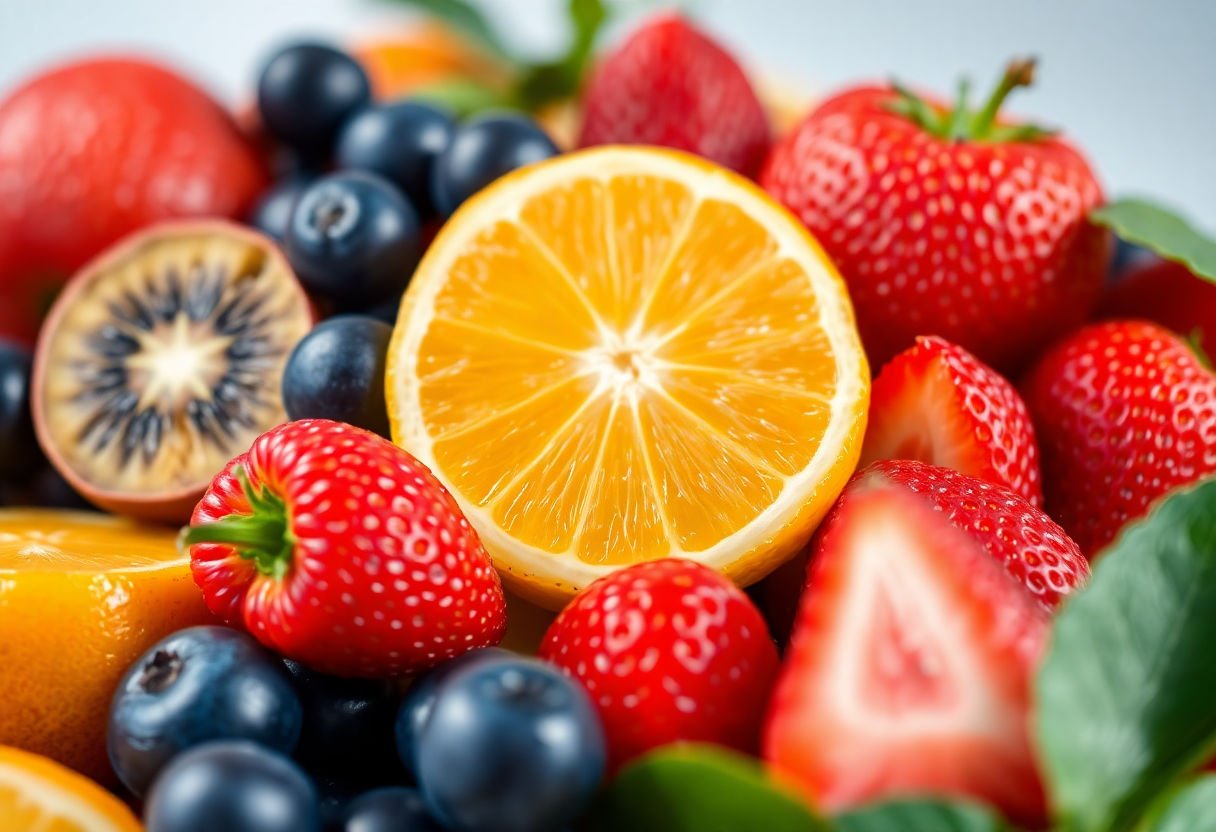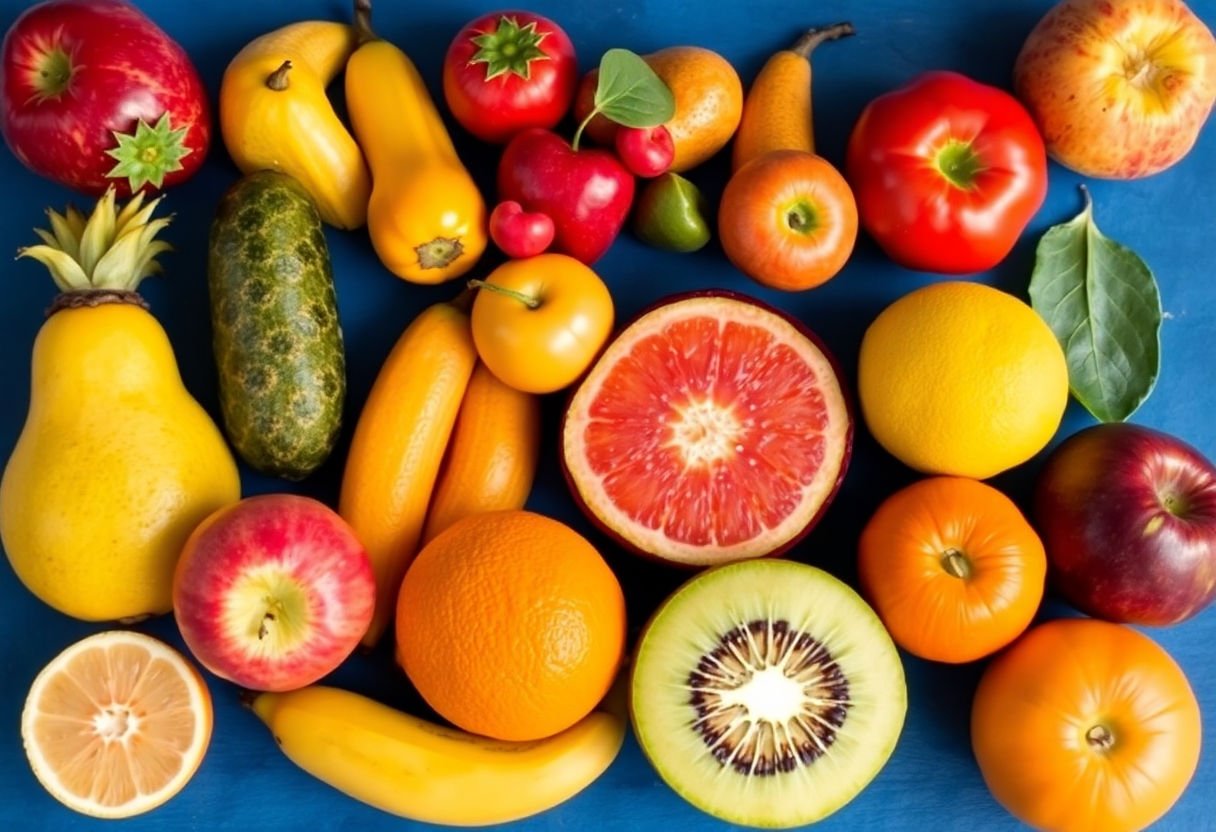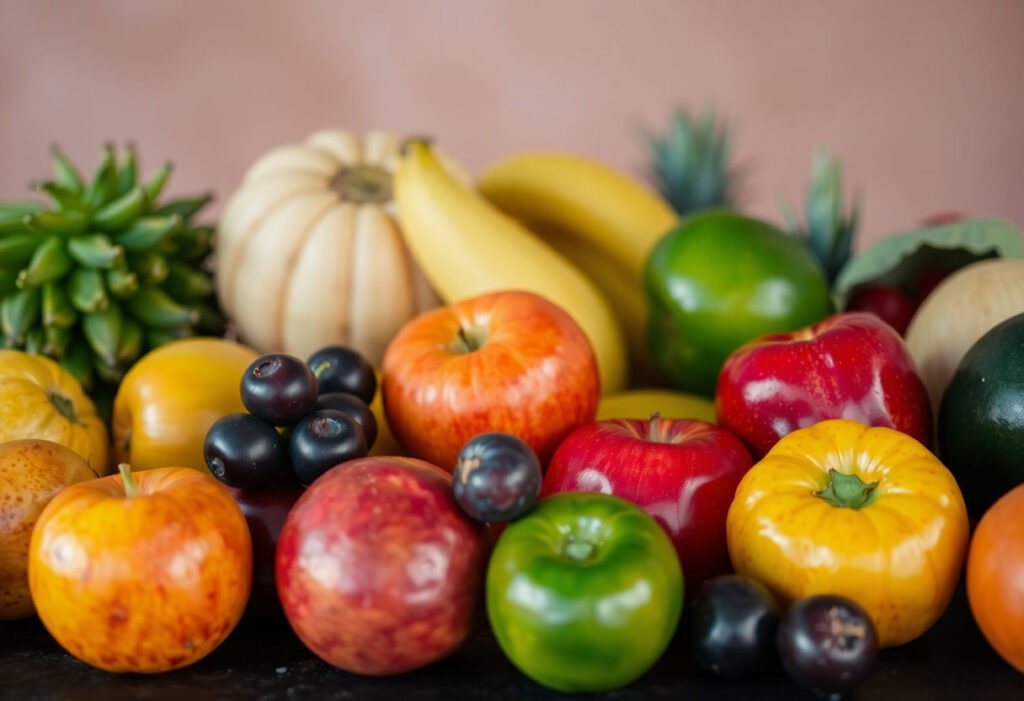Juicy fruits, rich in both flavor and nutrients, play an essential role in promoting health and wellness. These fruits are not only packed with vital nutrients but also aid in maintaining hydration, supporting weight management, and enhancing digestive health. By understanding the specific benefits of a variety of juicy fruits, and creatively incorporating them into your daily meals, you can significantly boost your overall well-being. Explore how these delightful fruits contribute to a healthier lifestyle, offering everything from powerful antioxidants to seasonal delights. Embrace the power of juicy fruits and revitalize your health journey today.
Key Takeaways
- Juicy fruits are an excellent source of essential nutrients that provide numerous health benefits, such as vitamins, minerals, and antioxidants.
- Incorporating a variety of juicy fruits into your daily meals can enhance hydration and support overall well-being.
- Consuming seasonal juicy fruits can maximize the nutritional benefits and support digestive health due to their natural fiber content.
- These fruits play a significant role in weight management through their low-calorie and high-satiety properties.
- By integrating juicy fruits into your diet, you can boost your nutritional intake, improve digestion, and achieve better health outcomes.
Nutritional Benefits of Juicy Fruits

Juicy fruits are a powerhouse of essential nutrients that play a pivotal role in maintaining and enhancing health. These vibrant fruits are rich in vitamins, minerals, and antioxidants—components vital for optimal bodily functions.
One of the foremost advantages of consuming juicy fruits is their high vitamin content. For instance, Vitamin C is abundant in citrus fruits like oranges and grapefruits, crucial for bolstering the immune system, aiding in collagen synthesis, and promoting wound healing. Similarly, Vitamin A, found in fruits such as mangoes and papayas, is essential for maintaining good vision and promoting skin health.
In addition to vitamins, minerals present in juicy fruits are indispensable for our health. Potassium, a mineral notably present in bananas and cantaloupes, helps regulate blood pressure by balancing the sodium levels in the body. This mineral is also vital for muscle function and reducing the risk of stroke.
Furthermore, juicy fruits are an excellent source of dietary fiber, which supports digestive health and assists in cholesterol management. Apples and pears, for example, contain pectin—a type of soluble fiber that helps lower cholesterol levels and regulate blood sugar.
Another significant benefit of juicy fruits is their low-calorie content combined with high nutrient density, making them ideal for those managing their weight. Their natural sweetness satisfies sugar cravings, while their high water content provides a sense of fullness, thus curbing overeating.
Incorporating a variety of juicy fruits into your diet can thus significantly contribute to a well-rounded, nutrient-rich diet that supports overall health and well-being.
Incorporating Juicy Fruits into Daily Meals

Incorporating juicy fruits into your daily meals can be a delightful and rewarding experience. These fruits not only add vibrant flavors but also enhance the nutritional profile of your diet.
One of the simplest ways to integrate these fruits is by starting your day with a fruit salad. Combine slices of oranges, grapes, and strawberries for a refreshing breakfast. This not only energizes you but also provides essential vitamins and fiber.
For a midday snack, consider a fruit and yogurt parfait. Layering fruits like pineapple and mango with yogurt creates a creamy and satisfying treat that boosts your probiotic intake. This can aid digestion and keep you feeling full longer.
Add depth to your lunch by incorporating fruits into your main dishes. Use apples or pears in salads for a sweet crunch. You might also try grilling peaches or pineapples to accompany savory proteins like chicken or fish. This not only complements the dish with sweetness but also infuses it with antioxidants.
When it comes to evening meals, consider making your own fruit-based sauces. A tangy orange glaze can transform a regular chicken dish into something extraordinary. Moreover, fruit salsas made from mangoes or tomatoes add a fresh touch to tacos or grilled meats.
Finally, treat yourself to a homemade smoothie by blending a variety of juicy fruits like watermelon, raspberries, and blueberries. This not only hydrates but also satisfies your sweet cravings while delivering a boost of antioxidants.
By creatively adding juicy fruits to your meals, you elevate both the culinary experience and the nutritional value of your diet substantially.
Top Juicy Fruits and Their Specific Benefits

Top Juicy Fruits and Their Specific Benefits
Juicy fruits are not only delicious, but they also offer a multitude of health benefits, making them a valuable addition to anyone’s diet. Here is a look at some top juicy fruits and their unique contributions to health:
-
Watermelon: Known for its high water content, watermelon is excellent for hydration. It contains lycopene, a powerful antioxidant that has been associated with heart health. An added benefit is its ability to support skin moisture due to its rich vitamin C content.
-
Oranges: A well-known source of vitamin C, oranges boost the immune system and improve skin health. They are also rich in fiber, aiding digestion and contributing to heart health by lowering cholesterol levels.
-
Grapes: These small fruits pack a punch with their high antioxidant content, including resveratrol, which is beneficial for heart health. Grapes can also improve brain function and slow down the signs of aging due to their phytonutrient content.
-
Pineapple: Not only does pineapple have anti-inflammatory properties, but it also supports digestion thanks to the enzyme bromelain. This tropical fruit is also high in antioxidants, supporting the immune system and bone health.
-
Kiwi: Kiwis are a powerhouse of nutrients, including vitamin C, K, and E. They are particularly beneficial for digestion as they contain actinidin, an enzyme that helps break down proteins. Additionally, kiwis can aid in respiratory health and enhance immune function.
Incorporating these juicy fruits into your diet can provide numerous health benefits, from boosting your immune system to supporting heart health and digestion. Enjoying a diverse array of fruits ensures you receive a variety of essential nutrients.
The Impact of Juicy Fruits on Hydration

Juicy fruits are essential in sustaining optimal hydration levels due to their high water content. Comprising up to 90% water in some cases, these fruits are a natural source of fluids, which is crucial for maintaining bodily functions. For instance, watermelon and cucumbers are predominantly composed of water, making them excellent choices for hydration.
Hydration does not only depend on liquid intake but also involves adequate electrolyte balance. Juicy fruits provide essential electrolytes such as potassium and magnesium, which help regulate bodily fluids. When consumed regularly, these fruits can complement water consumption, thereby promoting a well-hydrated body and aiding in maintaining energy levels.
Furthermore, juicy fruits can prove advantageous in environments where individuals are prone to dehydration, such as hot climates or during intense physical activities. By consuming these fruits, one can ensure a steady intake of vitamins and minerals that might be lost through sweating.
Some effective fruits known for their hydrating properties include:
- Watermelon: Contains approximately 92% water, aiding in hydration and providing vitamins A and C.
- Citrus Fruits: Oranges and grapefruits are not only juicy but are also packed with vitamin C, enhancing the immune system.
- Pineapple: Known for its sweet taste and ability to provide manganese, which supports metabolism.
In conclusion, integrating a variety of juicy fruits into one’s diet can significantly contribute to maintaining effective hydration, ensuring that the body’s cells function efficiently and healthily.
Juicy Fruits for Weight Management
Juicy fruits offer several benefits for those aiming to manage their weight effectively. Their high water content and fiber play a crucial role in promoting satiety, reducing the tendency to overeat. For example, incorporating watermelon or grapefruit into your diet can help you feel full longer due to their abundant water content, which dilutes calories and enhances hydration.
Fruits like oranges, berries, and apples are rich in dietary fiber, which slows down the digestion process, stabilizing blood sugar levels and curbing cravings. The natural sugars in these fruits provide a sustained source of energy, ideal for maintaining activity levels without the need for additional caloric intake.
Moreover, juicy fruits are inherently low in saturated fats and cholesterol, making them excellent options for a balanced diet aimed at reducing excessive weight. They also contain essential vitamins and antioxidants that support overall health while managing weight. For example, the vitamin C in kiwis and strawberries aids in boosting metabolism, which can enhance fat burning efficiency.
It’s beneficial to incorporate a variety of juicy fruits to ensure a diversified intake of nutrients. Consider these strategies:
- Add sliced berries to your morning cereal or yogurt for a nutrient boost.
- Enjoy a grapefruit or orange as a refreshing mid-morning snack.
- Combine mango or pineapple with leafy greens for a vibrant and satisfying lunch salad.
These practices not only diversify your diet but also contribute significantly to efficient weight management, supporting your journey toward revitalized health.
Antioxidants in Juicy Fruits
Antioxidants are vital compounds found abundantly in juicy fruits that play a significant role in maintaining optimal health. These natural substances help neutralize free radicals in the body, which are linked to chronic diseases, including cancer and cardiovascular disorders.
One of the primary antioxidants present in juicy fruits is vitamin C, known for boosting the immune system. Fruits like oranges, strawberries, and kiwis are rich in this essential nutrient, aiding in the repair of tissues and enzymes, and providing protection against immune system deficiencies.
Another critical antioxidant in juicy fruits is vitamin A. It is prevalent in fruits like cantaloupe and apricots, contributing to eye health and supporting cellular functions. This vitamin helps maintain healthy skin and mucous membranes, vital for defending the body against infection.
Polyphenols, another group of antioxidants, are found in abundance in fruits such as cherries and grapes. These compounds possess anti-inflammatory properties, which can reduce the risk of inflammatory conditions, including arthritis. Additionally, polyphenols support heart health by improving blood vessel function and reducing blood pressure.
Vitamin E, found in small amounts in fruits like mango, provides protection against oxidative stress, safeguarding cells from damage. Lycopene, predominantly present in watermelon and pink grapefruit, is recognized for its potential role in reducing the risk of prostate cancer and lowering bad cholesterol levels.
Incorporating a variety of these antioxidant-rich juicy fruits into your diet can be a delicious and effective way to enhance your overall well-being, contributing to a stronger immune defense and a reduction in the risk of various diseases.
Seasonal Juicy Fruits and Their Importance
Exploring the realm of seasonal juicy fruits unveils a vibrant tapestry of flavors and health benefits tied to their natural growth cycles. Consuming fruits in their season is not only beneficial for health but also for the environment and the local economy.
Seasonal fruits are harvested at their peak, offering superior flavors and textures compared to those that are off-season. Quality and freshness are guaranteed as they are sold soon after being picked, minimizing transportation time. This freshness contributes to higher nutritional value, preserving vital nutrients such as vitamins and antioxidants that are essential for optimal health.
Embracing seasonal fruits also supports sustainable agriculture. Purchasing from local farms reduces the carbon footprint associated with transport and storage, promoting environmental conservation. Moreover, this practice supports regional farmers, contributing to the local economy and ensuring a continued supply of wholesome produce year-round.
A few notable examples of seasonal juicy fruits include:
- Summer: Watermelon and peaches thrive in the summer heat, offering hydrating benefits due to their high water content.
- Fall: Grapes and apples provide a sweet and tart flavor combination perfect for autumn, rich in fibers and vitamins.
- Winter: Citrus fruits, such as oranges and grapefruits, flourish during the colder months, offering a boost of vitamin C to enhance immune function.
- Spring: Strawberries, with their luscious taste, signal the arrival of spring and are packed with antioxidants.
By aligning your diet with the natural seasons, you can enjoy a variety of flavors while maximizing the health benefits derived from nature’s bounty.
Juicy Fruits and Their Role in Digestive Health
Juicy fruits are indispensable allies in achieving optimal digestive health. Rich in dietary fiber, they play a crucial role in regulating bowel movements and preventing constipation. Fiber, found abundantly in fruits such as oranges and apples, adds bulk to stools and facilitates their passage through the digestive tract, ensuring a healthy rhythm.
Fruits like papayas and pineapples are packed with enzymes—papain and bromelain, respectively—that assist in breaking down proteins and speeding up digestion. These natural enzymes complement the body’s digestive processes, promoting an efficient nutrient absorption mechanism.
Moreover, juicy fruits serve as a natural prebiotic source by fortifying the gut. Prebiotics encourage the growth of beneficial bacteria that maintain gut balance. For instance, bananas contain fructooligosaccharides, which nourish gut flora, helping to create a protective environment against harmful bacteria.
Hydration is another essential factor achieved through consuming juicy fruits. High water content in fruits like watermelon and strawberries aids in maintaining fluid balance in the digestive system. This hydration helps dissolve fats and soluble fiber, allowing these nutrients to pass smoothly through the intestinal tract.
Incorporating a variety of juicy fruits into meals ensures an ingestion of essential vitamins and minerals that contribute to digestive efficiency. These fruits not only rejuvenate digestion but also enhance overall gut health, providing a foundation for sustained wellness and vitality. Making them a staple of the diet is a strategic step towards a healthier digestive system.
Conclusion
Incorporating juicy fruits into your diet is pivotal for revitalizing your health. Their abundant nutrients, from antioxidants to essential vitamins, promote wellness, aid hydration, and support weight management. As pivotal components of digestive health, these fruits prove indispensable. By embracing seasonal varieties, you ensure optimal nutritional intake while enjoying nature’s bounty. Moving forward, prioritize these fruits as key dietary staples to cultivate robust health and vitality. Remember, these vibrant fruits are not just sustenance but a conduit for a healthier tomorrow.
Frequently Asked Questions
What are some easy ways to incorporate juicy fruits into my diet daily?
Incorporating juicy fruits into your daily meals can be as simple as adding them to your breakfast cereal or yogurt, blending them into smoothies, or including them in salads. You can also snack on them throughout the day to naturally increase your fruit intake.
How do juicy fruits help with hydration?
Juicy fruits like watermelon and oranges have a high water content, which contributes significantly to your daily fluid intake. Consuming these fruits helps maintain optimum hydration, especially in warmer climates or during intense physical activity.
Can eating juicy fruits help with weight management?
Yes, many juicy fruits are low in calories and high in fiber, which can aid in weight management. The fiber content helps keep you full for longer periods, reducing the likelihood of overeating throughout the day.
Are there specific juicy fruits that are better for digestion?
Fruits such as pineapples and papayas contain digestive enzymes that can aid in breaking down proteins and improving gut health. Additionally, their fiber content promotes regular bowel movements and reduces the risk of digestive issues.
Is it necessary to eat only seasonal juicy fruits?
Eating seasonal fruits is encouraged as they are fresher, often more flavorful, and contain nutrients at their peak levels. However, out-of-season fruits can still be a healthy choice and provide essential vitamins and minerals.


